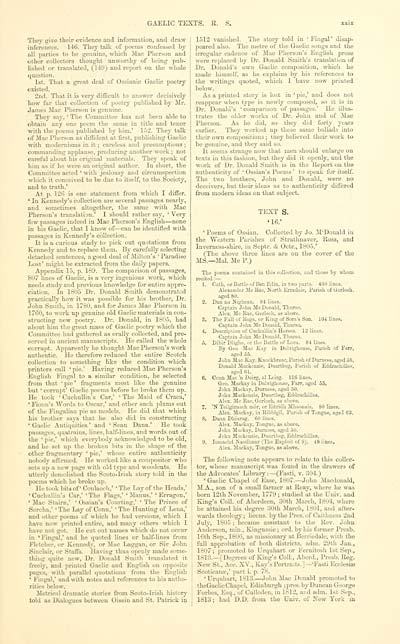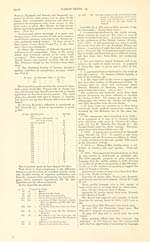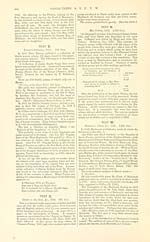Download files
Complete book:
Individual page:
Thumbnail gallery: Grid view | List view

GAELIC TEXTS. R. S.
They give their evidence and information, and draw
inferences. 146. They talk of poems confessed by
all parties to be genuine, which Mac Pherson and
other collectors thought unworthy of being pub-
lished or translated, (149) and report on the whole
question.
1st. That a great deal of Ossianic Gaelic poetry
existed.
2nd. That it is very difficult to answer decisively
Low far that collection of poetry published by Mr.
James Mac Pherson is genuine.
They say, ' The Committee has not been able to
obtain any one poem the same in title and tenor
■with the poems published by him.' 152. They talk
of Mac Pherson as diffident at first, publishing Gaelic
■with modernisms in it ; careless and presumptions ;
commanding applause, producing another work ; not
careful about his original materials. They speak of
him as if he were an original author. In short, the
Committee acted ' with jealousy and circumspection
■which it conceived to be due to itself, to the Society,
and to truth.'
At p. 126 is one statement from which I differ.
' In Kennedy's collection are several passages nearly,
and sometimes altogether, the same with Mac
Pherson's translation.' I should rather say, ' Very
few passages indeed in Mac Pherson's English — none
in his Gaelic, that I know of — can be identified -with
passages in Kennedy's collection.
It is a curious study to pick out quotations from
Kennedy and to replace them. By carefully selecting
detached sentences, a good deal of Milton's ' Paradise
Lost' might be extracted from the daily papers.
Appendix 1.5, p. 189. The comparison of passages,
807 lines of Gnelic, is a veiy ingenious work, which
needs study and previous knowledge for entire appre-
ciation, in 1805 Dr. Donald Smith demonstrated
practically how it ■^vas possible for his brother. Dr.
John Smith, in 1780, and for James Mac Pherson in
17C0, to work up genuine old Gaelic materials in con-
structing new poetry. Dr. Donald, in 1805, had
sibout him the great mass of Gaelic poetry which the
Committee had gathered as orally collected, and pre-
served in ancient manuscripts. He called the whole
corrupt. Apparently he thought Mac Pherson's work
authentic. He therefore reduced the entire Scotch
collection to something like the condition -n'hich
printers call ' pie.' Having reduced Mac Pherson's
English Fingal to a similar condition, he selected
from that ' pie ' fragments most like the genuine
but ' corrupt' Gaelic poems before he broke them up.
He took ' Cuchulhn's Car,' ' The Maid of Craca,'
' Fionn's Words to Oscar,' and other such plums out
of the Fingahan pie as models. He did that which
his brother says that he also did in constructing
' Gaehc Antiquities ' and ' Sean Dana.' He took
passages, quatrains, lines, half-lines, and words out of
the ' pie,' which everybody acknowledged to be old,
and he set up the broken bits in the shape of the
other fragmentary ' pie,' whose entire authenticity
nobody affirmed. He worked like a compositor who
sets up a new page with old type and woodcuts. He
utterly demolished the Scoto-Irish story told in the
poems which he broke up.
He took bits of Coulaocb,' ' The Lay of the Heads,'
'CachuUin's Car,' 'The Flags,' ' Manus,' ' Erragon,'
' Mac Stairn,' ' Ossian's Courting,' ' The Prince of
Sorcha,' ' The Lay of Conn,' ' The Hunting of Lena,'
and other poems of which he had versions, which I
have now printed entire, and many others which I
have not got. He cut out names which do not occur
in 'Fingal,' and he quoted lines or half-lines from
Fletcher, or Kennedy, or ilac Laggan, or Sir John
Sinclair, or Staffa. Having thus openly made some-
thing quite new, Dr. Donald Smith translated it
freely, and printed Gaelic and English on opposite
pages, with parallel quotations from the English
' Fingal,' and with notes and references to his autho-
rities below.
Metrical dramatic stories from Scoto-Irish history
told as Dialogues between Oisein and St. Patrick in
1512 vanished. The story told in 'Fingal' disap-
peared also. The metre of the Gaelic songs and the
irregular cadence of ilac Pherson's English prose
were replaced by Dr. Donald Smith's translation of
Dr. Donald's own GaoHc composition, which he
made himself, as he explains by his references to
the writings quoted, which I have now printed
below.
As a printed story is lost in ' pie,' and does not
reappear when type is newly composed, so it is in
Dr. Donald's 'comparison of passages.' He illus-
trates the older works of Dr. John and of ilac
Pherson. As he did, so they did forty years
earlier. They worked up these same ballads into
their o-wn compositions ; they believed their work to
be genuine, and they said so.
It seems strange now that men should enlarge on
texts in this fashion, but they did it openly, and the
work of Dr. Donald Smith is in the Report on the
authenticity of ' Ossian's Poems ' to speak for itself.
The two brothers, John and Donald, were no
deceivers, but their ideas as to authenticity differed
from modern ideas on that subject.
TEXT S.
'16.'
' Poems of Ossian. Collected by Jo. M'Donald in
the Westei-n Parishes of Strathnaver, Ross, and
Inverness-shire, in Septr. & Octr., 1805.'
(The above three lines are on the cover of the
MS.— MaL Mo P.)
The poems contained in this collection, and those by -H-hom
recited : —
1. Cath, or Battle of Ben Edin, in two p,arts. 400 lines.
Alexander Mc Hae, North Erradale, Parish of Gerloch,
aged 80.
2. Dan na Nighean. 84 lines.
Captain Jolin McDonald, Thurso.
Alex. Mc Eae, Gerloch, as above.
3. TheFallof Roga, or Kingof Sora'sSon. lO-llines.
Captain John Mc Donald, Thurso.
4. Description of Cuchullin's Horses. 12 lines.
Captain John Mc Donald, Thurso.
."). Dibir Dlighe, or the Battle of Lora. 84 lines.
By Geo. Mac Kay in Dalvighouse, Parish of Farr,
aged 55.
John Mac Kay, Knockbreac, Parish of Durness, aged 58.
Donald Mackenzie, Duartbeg, Parish of Eddrachilles,
aged 61.
6. Conn Mac 'n Deirg, al Leirg. 116 lines.
Geo. Mackay in Dalvighouse, Farr, aged 55.
John Mackay, Durness, aged 50.
John Mackenzie, Duartbeg, Eddrachilles.
Alex. Mc Rae, Gerloch, as above.
7. 'N Teilgirnach mòr, or Eitridh Mhaonais. SO lines.
Alex. Mackay, in Ribbigil, Parish of Tongue, aged 63.
8. Duan Dhiarag. 60 lines.
Ales. Mackay, Tongue, as above.
John Mackay, Durness, aged 50.
John Mackenzie, Duartbeg. Eddrachilles.
9. lomachd Naodhnar (The Exploit of 9). 48 lines.
Alex. Mackay, Tongue, as above.
The foUo-sving note appears to relate to this collec-
tor, whose manuscript was found in the drawers of
the Advocates' Library: — (Fasti, v. 304.)
' Gaehc Chapel of Ease, 1807. — John Macdonald,
M.A., son of a small farmer at Reay, where he was
bom 12th November, 1779 ; studied at the Univ. and
King's Coll. of Aberdeen, oOth March, 1804, where
he attained his degree oOth March, 1801, and after-
wards theology ; licens. by the Pres. of Caithness 2nd
July, 1805 ; became assistant to the Rev. John
Anderson, min., Kingussie ; ord. by his former Presb.
16th Sep., 1806, as missionary at Berriedale, with the
full approbation of both districts, adm. 29th Jan.,
1807 ; promoted to Urquhart or Fernitosh 1st Sep.,
1813.— [Degrees of King's Coll., Aberd., Presb. Reg.
New St., Ace. XV., Kay's Portraits.] — 'Fasti Ecclesioe
Scoticanas,' part i. p. 78.
' Urquhart, 1813. — John Mac Donald promoted to
theGaelic Chapel, Edinburgh ; pres. by Duncan George
Forbes, Esq., of Culloden, in 1812, and adm. 1st Sep.,
1813 ; had D.D. from the Univ. of New York in
They give their evidence and information, and draw
inferences. 146. They talk of poems confessed by
all parties to be genuine, which Mac Pherson and
other collectors thought unworthy of being pub-
lished or translated, (149) and report on the whole
question.
1st. That a great deal of Ossianic Gaelic poetry
existed.
2nd. That it is very difficult to answer decisively
Low far that collection of poetry published by Mr.
James Mac Pherson is genuine.
They say, ' The Committee has not been able to
obtain any one poem the same in title and tenor
■with the poems published by him.' 152. They talk
of Mac Pherson as diffident at first, publishing Gaelic
■with modernisms in it ; careless and presumptions ;
commanding applause, producing another work ; not
careful about his original materials. They speak of
him as if he were an original author. In short, the
Committee acted ' with jealousy and circumspection
■which it conceived to be due to itself, to the Society,
and to truth.'
At p. 126 is one statement from which I differ.
' In Kennedy's collection are several passages nearly,
and sometimes altogether, the same with Mac
Pherson's translation.' I should rather say, ' Very
few passages indeed in Mac Pherson's English — none
in his Gaelic, that I know of — can be identified -with
passages in Kennedy's collection.
It is a curious study to pick out quotations from
Kennedy and to replace them. By carefully selecting
detached sentences, a good deal of Milton's ' Paradise
Lost' might be extracted from the daily papers.
Appendix 1.5, p. 189. The comparison of passages,
807 lines of Gnelic, is a veiy ingenious work, which
needs study and previous knowledge for entire appre-
ciation, in 1805 Dr. Donald Smith demonstrated
practically how it ■^vas possible for his brother. Dr.
John Smith, in 1780, and for James Mac Pherson in
17C0, to work up genuine old Gaelic materials in con-
structing new poetry. Dr. Donald, in 1805, had
sibout him the great mass of Gaelic poetry which the
Committee had gathered as orally collected, and pre-
served in ancient manuscripts. He called the whole
corrupt. Apparently he thought Mac Pherson's work
authentic. He therefore reduced the entire Scotch
collection to something like the condition -n'hich
printers call ' pie.' Having reduced Mac Pherson's
English Fingal to a similar condition, he selected
from that ' pie ' fragments most like the genuine
but ' corrupt' Gaelic poems before he broke them up.
He took ' Cuchulhn's Car,' ' The Maid of Craca,'
' Fionn's Words to Oscar,' and other such plums out
of the Fingahan pie as models. He did that which
his brother says that he also did in constructing
' Gaehc Antiquities ' and ' Sean Dana.' He took
passages, quatrains, lines, half-lines, and words out of
the ' pie,' which everybody acknowledged to be old,
and he set up the broken bits in the shape of the
other fragmentary ' pie,' whose entire authenticity
nobody affirmed. He worked like a compositor who
sets up a new page with old type and woodcuts. He
utterly demolished the Scoto-Irish story told in the
poems which he broke up.
He took bits of Coulaocb,' ' The Lay of the Heads,'
'CachuUin's Car,' 'The Flags,' ' Manus,' ' Erragon,'
' Mac Stairn,' ' Ossian's Courting,' ' The Prince of
Sorcha,' ' The Lay of Conn,' ' The Hunting of Lena,'
and other poems of which he had versions, which I
have now printed entire, and many others which I
have not got. He cut out names which do not occur
in 'Fingal,' and he quoted lines or half-lines from
Fletcher, or Kennedy, or ilac Laggan, or Sir John
Sinclair, or Staffa. Having thus openly made some-
thing quite new, Dr. Donald Smith translated it
freely, and printed Gaelic and English on opposite
pages, with parallel quotations from the English
' Fingal,' and with notes and references to his autho-
rities below.
Metrical dramatic stories from Scoto-Irish history
told as Dialogues between Oisein and St. Patrick in
1512 vanished. The story told in 'Fingal' disap-
peared also. The metre of the Gaelic songs and the
irregular cadence of ilac Pherson's English prose
were replaced by Dr. Donald Smith's translation of
Dr. Donald's own GaoHc composition, which he
made himself, as he explains by his references to
the writings quoted, which I have now printed
below.
As a printed story is lost in ' pie,' and does not
reappear when type is newly composed, so it is in
Dr. Donald's 'comparison of passages.' He illus-
trates the older works of Dr. John and of ilac
Pherson. As he did, so they did forty years
earlier. They worked up these same ballads into
their o-wn compositions ; they believed their work to
be genuine, and they said so.
It seems strange now that men should enlarge on
texts in this fashion, but they did it openly, and the
work of Dr. Donald Smith is in the Report on the
authenticity of ' Ossian's Poems ' to speak for itself.
The two brothers, John and Donald, were no
deceivers, but their ideas as to authenticity differed
from modern ideas on that subject.
TEXT S.
'16.'
' Poems of Ossian. Collected by Jo. M'Donald in
the Westei-n Parishes of Strathnaver, Ross, and
Inverness-shire, in Septr. & Octr., 1805.'
(The above three lines are on the cover of the
MS.— MaL Mo P.)
The poems contained in this collection, and those by -H-hom
recited : —
1. Cath, or Battle of Ben Edin, in two p,arts. 400 lines.
Alexander Mc Hae, North Erradale, Parish of Gerloch,
aged 80.
2. Dan na Nighean. 84 lines.
Captain Jolin McDonald, Thurso.
Alex. Mc Eae, Gerloch, as above.
3. TheFallof Roga, or Kingof Sora'sSon. lO-llines.
Captain John Mc Donald, Thurso.
4. Description of Cuchullin's Horses. 12 lines.
Captain John Mc Donald, Thurso.
."). Dibir Dlighe, or the Battle of Lora. 84 lines.
By Geo. Mac Kay in Dalvighouse, Parish of Farr,
aged 55.
John Mac Kay, Knockbreac, Parish of Durness, aged 58.
Donald Mackenzie, Duartbeg, Parish of Eddrachilles,
aged 61.
6. Conn Mac 'n Deirg, al Leirg. 116 lines.
Geo. Mackay in Dalvighouse, Farr, aged 55.
John Mackay, Durness, aged 50.
John Mackenzie, Duartbeg, Eddrachilles.
Alex. Mc Rae, Gerloch, as above.
7. 'N Teilgirnach mòr, or Eitridh Mhaonais. SO lines.
Alex. Mackay, in Ribbigil, Parish of Tongue, aged 63.
8. Duan Dhiarag. 60 lines.
Ales. Mackay, Tongue, as above.
John Mackay, Durness, aged 50.
John Mackenzie, Duartbeg. Eddrachilles.
9. lomachd Naodhnar (The Exploit of 9). 48 lines.
Alex. Mackay, Tongue, as above.
The foUo-sving note appears to relate to this collec-
tor, whose manuscript was found in the drawers of
the Advocates' Library: — (Fasti, v. 304.)
' Gaehc Chapel of Ease, 1807. — John Macdonald,
M.A., son of a small farmer at Reay, where he was
bom 12th November, 1779 ; studied at the Univ. and
King's Coll. of Aberdeen, oOth March, 1804, where
he attained his degree oOth March, 1801, and after-
wards theology ; licens. by the Pres. of Caithness 2nd
July, 1805 ; became assistant to the Rev. John
Anderson, min., Kingussie ; ord. by his former Presb.
16th Sep., 1806, as missionary at Berriedale, with the
full approbation of both districts, adm. 29th Jan.,
1807 ; promoted to Urquhart or Fernitosh 1st Sep.,
1813.— [Degrees of King's Coll., Aberd., Presb. Reg.
New St., Ace. XV., Kay's Portraits.] — 'Fasti Ecclesioe
Scoticanas,' part i. p. 78.
' Urquhart, 1813. — John Mac Donald promoted to
theGaelic Chapel, Edinburgh ; pres. by Duncan George
Forbes, Esq., of Culloden, in 1812, and adm. 1st Sep.,
1813 ; had D.D. from the Univ. of New York in
Set display mode to: Large image | Transcription
Images and transcriptions on this page, including medium image downloads, may be used under the Creative Commons Attribution 4.0 International Licence unless otherwise stated. ![]()
| Early Gaelic Book Collections > Ossian Collection > Leabhar na Feinne > (33) |
|---|
| Permanent URL | https://digital.nls.uk/80030317 |
|---|
| Description | Selected books from the Ossian Collection of 327 volumes, originally assembled by J. Norman Methven of Perth. Different editions and translations of James MacPherson's epic poem 'Ossian', some with a map of the 'Kingdom of Connor'. Also secondary material relating to Ossianic poetry and the Ossian controversy. |
|---|
| Description | Selected items from five 'Special and Named Printed Collections'. Includes books in Gaelic and other Celtic languages, works about the Gaels, their languages, literature, culture and history. |
|---|

